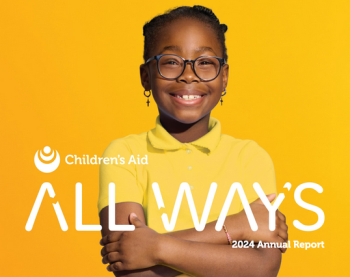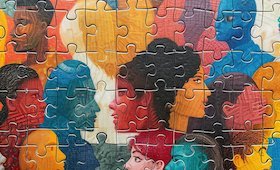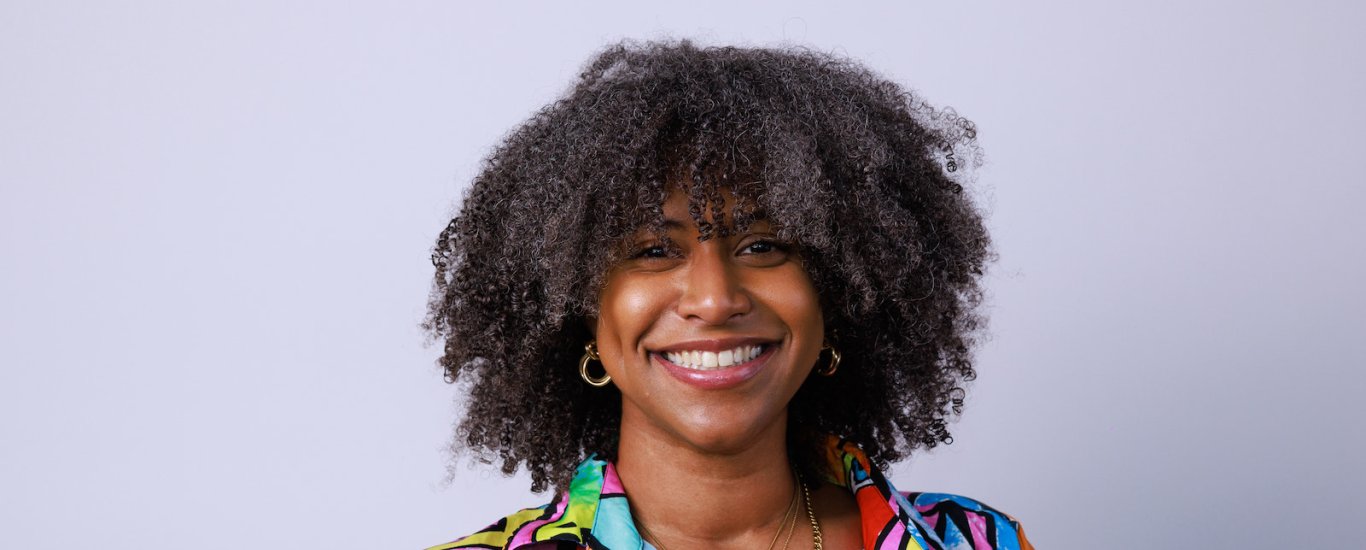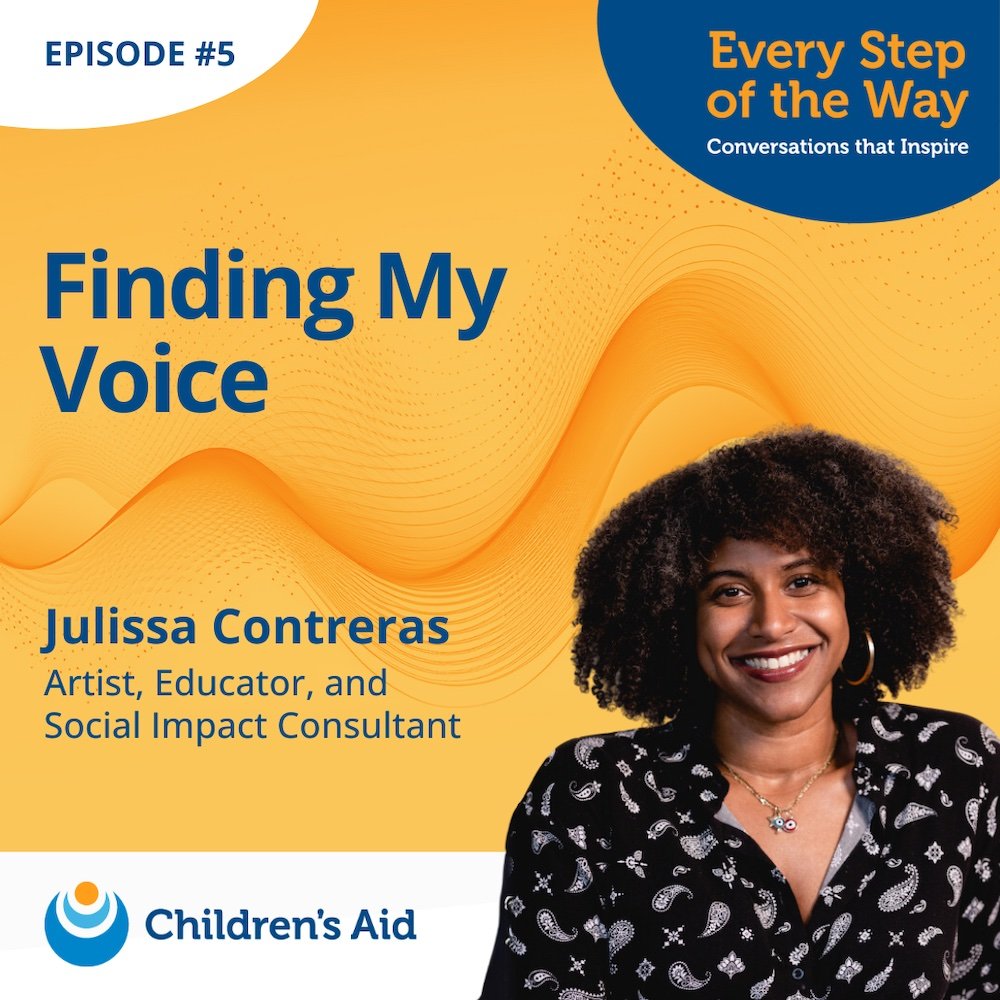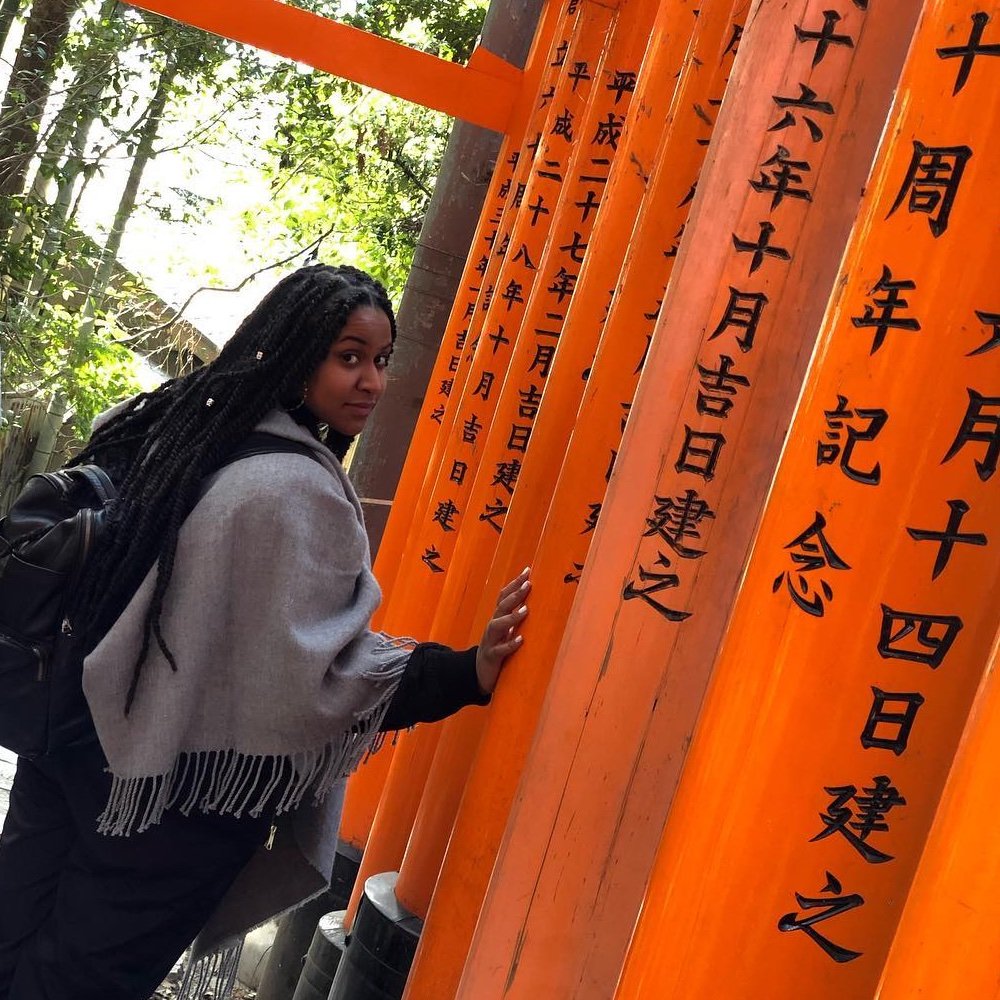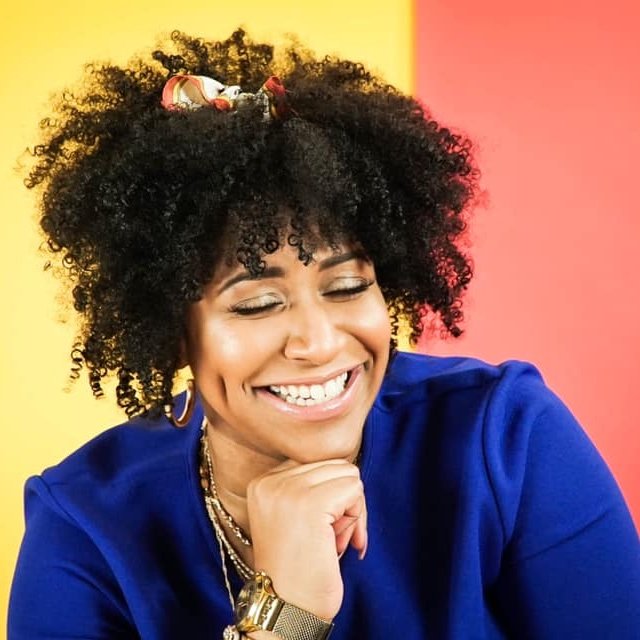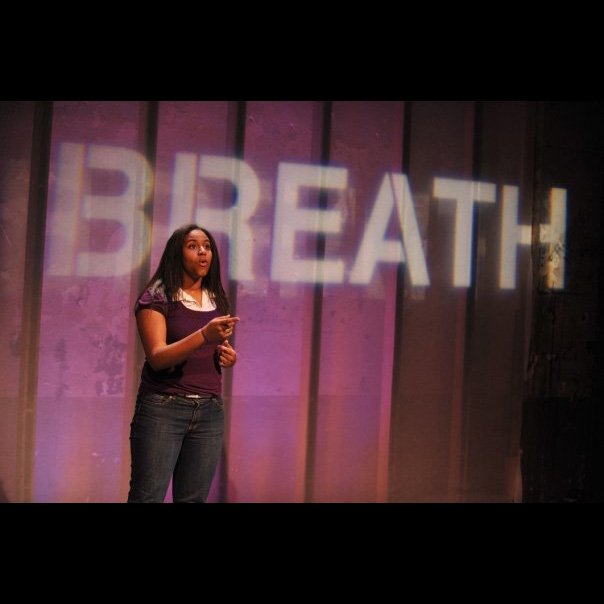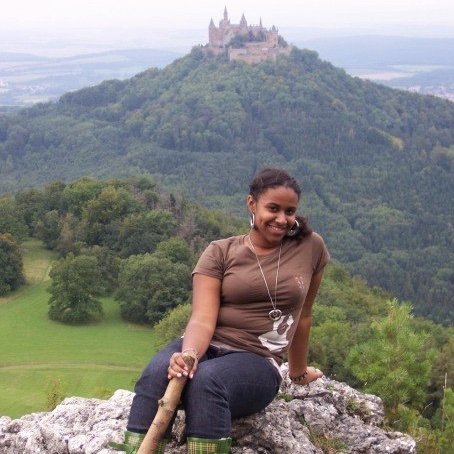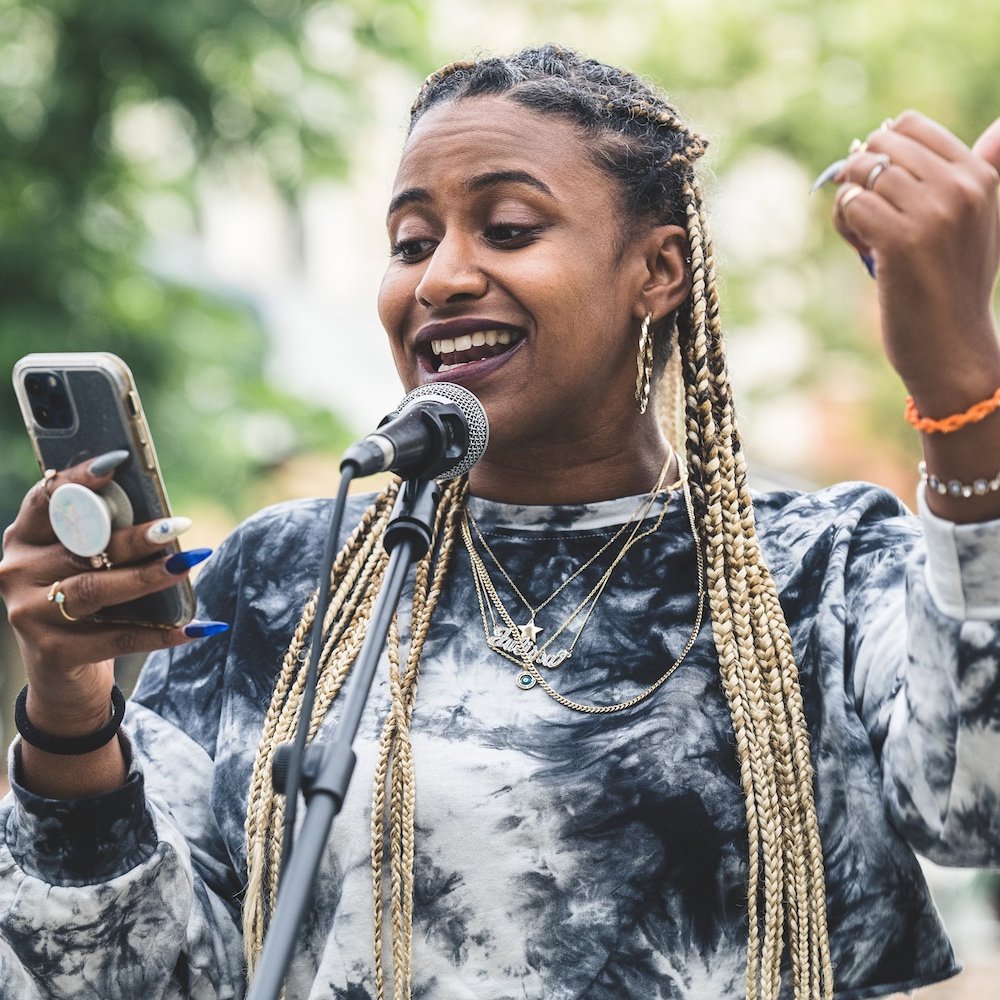Georgia Boothe: [00:00:00] Welcome to another episode of Every Step of the Way, a Children's Aid podcast. I have with me here today, a very special guest host, Sarah Jonas. Sarah is the vice president of our youth division here at Children's Aid. And she's going to join me today in our conversation with Julissa Contreras, who is an alumni of Children's Aid.
Take it away, Sarah.
Sarah Jonas: Thanks, Georgia. I am truly excited to be here, and I'm a big fan of this podcast, having listened to the first episode, so I know how awesome it is, and I'm so excited to be here and be able to talk with you and with Julissa.
Georgia Boothe: Awesome. So, Julissa, welcome. It's so amazing to have you here and to be part of this podcast. We've done a number of these and I just love hearing the stories of all the alumni and staff that have benefited from the [00:01:00] services of Children's Aid. So, welcome and let's get into it a little bit, right?
Tell us a little bit about yourself, a little bit about your background and at the point at which you came in contact with Children's Aid.
Julissa Contreras: Sure. Thank you so much for having me. It's a dream come true to be on a podcast for Children's Aid. Children's Aid entered my life when I was in sixth grade and I was in the South Bronx. I am a first generation Dominicana. Both my parents came over from the Dominican Republic and really from a young age instilled in me the importance of community. And as a young person, I was always riled up and wanting to participate in things, but really, there was a big scarcity of programming where I grew up and had essentially no programming in elementary school.
But in that middle school I was in, the I.S. 98 location in which Children's Aid came and did afterschool programming. And it was the first time in my life that any concept of any community programming or afterschool had [00:02:00] even entered or crossed my path. And it really was the catalyst that, and I say this truly, honestly, allowed for me to find my voice.
And it allowed for me to find my power. One of the first programs I joined was community justice. And I loved community justice because at the time I was quite convinced that I would be mayor of New York City. Because I was unhappy with the conditions of my school and saw C.A.S. as just one very necessary resource that felt like they were there for me to then stand on the shoulders of their work to take that impact even further. And I took that quite seriously. And you know, throughout my years, like my first job was at our local council person's office by way of Children's Aid Society and that community justice program. And so really to be able to boast that I worked at my local politician's office as my first job ever, and not like McDonald's and not that there's anything wrong with that, but just the fact that they were able to meet my passion where I was at, [00:03:00] even at such a young age, was super catalytic for me. And then, you know, really called me into not only go through several other programs after that, but to also give back. And so, my first job after that job was back with C.A.S. and then the job after that was back with C.A.S.
And I found myself being able to navigate the different programming and different community members that were benefiting from what Children's Aid was able to bring. And it started to really bring that holistic picture of what C. A. S. was doing as a presence in my community, even in services that I personally didn't need.
And it really drove my passion to not just be an employee and get a check, but to commit myself. And I really learned what it was like to do something you love for people you love for over 10 years in Children's Aid before I eventually transitioned out shortly after graduating college.
Georgia Boothe: That's amazing. Thank you for sharing that. I don't know, Sarah, do you want to ask Julissa a question?
Sarah Jonas: I'd love to. I love that answer, and I [00:04:00] love that there was so much you were talking about love, right? You had that look on your face and you're talking about that love. And I guess, I was curious to know what about the either the program that you talked about, the community justice program or the other programs you were involved in at Children's Aid, what about it?
Was it like the staff, the design of the program, like what in that program kind of got you to that place where, like you said, you felt like your voice mattered and you were able to step up into your leadership, into your passion. I'd love to hear a little bit more about that.
Julissa Contreras: Yeah, sure. You know, it was definitely a stew that had different ingredients, and I think it's a bit of everything that you named. In terms of program structure, when I was in seventh grade I joined our youth leadership program, right? And so, we had a youth council, and we took our job very seriously. And so I think that the structure and the ways in which we really were empowered and given tools to make decisions and that the staff and the team there really honored our vision and also brought that like, wisdom into the picture to [00:05:00] really help us facilitate big things. I mean, there was that, there's that seminar and Southern Boulevard that got built later on. That's the adolescent center and I'm blanking on the name right now, but…
Georgia Boothe: The Next Generation Center. Yeah.
Julissa Contreras: I was in the youth council group that was in constant communication with the local politicians, went up to Albany a bunch of times to help that center come to fruition.
And so like, and I didn't personally have a deep interaction with Next Gen in the years after it opened. But every time I ride the two train and pass there, I know I played a part in that.
And I know that there's a bigger team, but to know that Children's Aid allowed for their youth to have that much of an impact in their longer term vision really empowers me and allows me to know that I've contributed something to this world and I'm not a failure. Like the, we have contributed things to our community.
And I think that the staff and just by the nature of the staff, really being part of our community and them hiring internally a lot, and even a lot of the [00:06:00] promotion. That came through. It was people who were once my counselors who I then had the joy of seeing stepping into these larger roles as the company grew, which also broke some of this hierarchy that can exist sometimes in organizations.
And I think that as I was maturing and going through high school and in college and working in Children's Aid, I was able to really show up as my grownup self with other adults who still had that care and consideration for me from when I was a child, but also saw my power and impact and kept giving me roles and responsibilities, even outside of the scope of work so that I could really use Children's Aid as a playground. And so, at different stages of my life, it really fed me. And so, by the time I had my last role, which was a youth leadership program manager at Hope Leadership Academy, right?
Like I, was then in this sort of like nucleus of knowing what the Children's Aid way was and was able to then pass that torch forward and instill that in the young kids that were in my hands at that time. [00:07:00] And can still see those mindset practices and values in the ways that they're leading their lives.
Georgia Boothe: Julissa, that is so awesome. You are a living example of when we talk about making sure that the voice of lived experience is like involved in our decision making and involved in designing like what we do and how we do like, I'm just getting goosebumps listening to you talk about your experience there because we have conversations today about how we incorporate the voice of our parents and children and youth into what we do. And so, this is just like fuel for us to continue to do this. Thank you for emphasizing that.
So, as you progress, like how did your experience at Children's Aid kind of, influence like where you went educationally and career wise?
Julissa Contreras: Yeah, that's a great question. So, in the middle school that I went to, I.S. 98, we didn't have any arts [00:08:00] programming. And so, Children's Aid really became a vehicle to bring people in. And so, we had somebody who came to do a poetry workshop. She was sort of a like one off engagement but was brought in by way of Children's Aid.
And I had wrote my first poem and performed it. It was my first time ever doing spoken word. And that facilitator looked me in the eye and was like, “Are you an actor? Because I think you're an actor.” And I was like I don't know. I think I'm trying to be mayor and I think politicians have to act. So kind of maybe, yeah.
And then she was like, here's this high school, LaGuardia Performing Arts, and I think you should go. And like that, the pipeline of really facilitating kids to specialize high schools was not quite strong for I.S. 98 prior to supportive programming, like Children's Aid. And so literally the timing, it was like weeks out.
I went, I like didn't even know what a monologue was. I prepared, I auditioned, I got in and being able to step into that school was like a completely different setting. But again, when you think about catalyzing impact for young people and why it's important to [00:09:00] fund these programs, it took one small week engagement with a facilitator to put me on the pathway to be now an award-winning off-Broadway playwright.
So, like when you think about how important every moment is like it is not lost on me based on my own experience how that was able to catalyze that. But furthermore, like my social, my love for social justice and social impact was really fostered at Children's Aid Society. I truly don't think I would have recognized the power of my voice at all stages in my life if I did not have those vehicles of advocacy that were there just as much as the services that I was receiving.
So the cycle of how we maintain and sustain our communities, I learned solely from Children's Aid Society and then was able to take that into several roles that I've had afterwards, whether it's creative roles or, you know, I've been in the startup world for over eight years now. I worked at WeWork, which was like this big startup.
It was like this unicorn. And like, found myself I was reporting directly to the co-founder like I made [00:10:00] it to c suite not trying to make it to c suite but solely because I held on to the values of how I think spaces need to operate to sustain communities and the value of that really started to shine even in spaces like that without a Harvard MBA or any of those markers. And so again, I think most of all the mindsets, practices, and values that Children's Aid allow for me to develop and grow within that safe space really gave me my spine to take on the world
Georgia Boothe: Wow. I just have goosebumps all over listening to you.
It's powerful stuff.
It is powerful stuff. It's some powerful stuff.
And this is why these conversations are so important because we get, like, just caught up in the administration of the work that we try to do every day.
And this is like, fuel for the soul just like listening to you because it helps to remind us of why we're doing what we're doing, especially on [00:11:00] days when it gets really hard. So thank you for that,
Sarah Jonas: Julissa, I was actually, you mentioned Hope Leadership Academy before. I was there just last Friday and they were welcoming their new cohort of young people to start the program year. So, there was this like wonderful energy in the room.
And the staff were repeatedly saying to the young people, like our job is to help you be the best version of yourself you can possibly be. Like that is the reason why we are here. So, in hearing you talk and your passion thinking back to your own experience, I was wondering what advice like if you were in that room with that incoming cohort of Hope Leadership Academy youth, what would you tell them?
What advice would you give them based on your own experience at Children's Aid and beyond?
Julissa Contreras: I think the biggest takeaway is one, I would tell them, “Listen to your intuition,” right? There's this inner knowing, there's something that really propels you forward. And then once you're able to really identify that voice, allow yourself to use this space, [00:12:00] this community of supportive adults, these resources, to really explore what that means for your future.
It's not always about, Oh, have the best grades or be the most, you know, highest achiever in every area. In fact, this is the time in your life where you have the most room to not be great at most things. And so, allow yourself to fail while you're having fun, right? And I think that the intuitive voice really does lead people to follow a yes, that even if there is a challenge, right, nobody is absolved of challenges and hardships, but like sometimes, go through that because universally something is aligning to prepare you for something bigger.
And so like, don't run away from the challenges, know that you are in a safe space, know that this space, especially a space like Hope was built with so much love and intention from generations of facilitators and people who have instilled values that everybody has to, it's almost like there's a hope way.
So, allow yourself to play in the Hope way, following the yes in your [00:13:00] intuition, and you will be so shocked how far you will get.
Sarah Jonas: I love that so much.
Georgia Boothe: Yes. Along the same lines, like what advice would you offer to staff that are facing the challenges of young people these days and what they're seeing from, young people are struggling with are similar, but very different, right? And what advice would you offer our staff especially on those days where it feels overwhelming and they're not sure if they're doing the right thing.
Julissa Contreras: That is a great question, and I'm so glad that you asked it because I think we often forget how important it is for the teams that are holding space for our young people to also be poured into and have that moment.
And so, my advice would be like, know what you need to fill your cup. We know you are passionate.
We know you care about these young people. You know that you might feel like, if not me, then who will do this job with the level of rigor and intention that I do? Then protect that if you really believe that it takes [00:14:00] you being there and you grinding as much as you can grind. Fill your cup because the burnout is something that is very difficult to come back from and again like I said to the young people, follow your intuition. Sometimes what you are being led to do in a moment might not interest for the young people or the collective but if is, again part of your restoration and longevity, then you have to make the difficult decisions to know when you have to step back and trust that those around you are capable of stepping up and supporting what happens in your absence.
Georgia Boothe: Yes. Thank you for that. I think we may have to edit that piece out and share that with our staff. I think that's such wonderful advice.
Sarah Jonas: Julissa. I know that I also, I was so moved reading about some of the work that you're doing with organizations like Children's Aid, right? I know you have all these aspects to who you are, and I saw that one of them is really helping to guide whether it's in strategy, D.E.I.B. work just helping organizations essentially be the best version of themselves that they can be, right?
And so, I would just love to hear a little bit about [00:15:00] how your experience with Children's Aid and maybe looking back on it, how that might have shaped how you are now approaching your work with other nonprofits in this time and space.
Julissa Contreras: Yes, I think, you know, going back to the resource and gem that is Hope Leadership Academy. They had their peer education program and facilitation and just being able to command a room to communicate important things that teams need to work on is something that I've been doing since I was an adolescent.
And so, it was a natural transition for me sort of coming out of tech, finding myself in this moment where I'm not at a company, but I have so much to give. Again, in the Children's Aid way, when you have something to offer and you see a community in need, you just fill those gaps. And so for me, just that ambition and the trust of knowing what it means to dedicate yourself in a particular way with those practices and offer them.
Like I got to test that out in Children's Aid so I know it works. So for me, it kind of feels like a natural transition and it wasn't my years in tech that taught me that, or even my years in the creative field. [00:16:00] It was what was instilled in me as a young person. Again, the foundations that matter in our adulthood are often built in our childhood, just like the things that unravel in our adulthood that make us, you know, maybe not show up as our best self or our most triggered selves.
It always goes back to the child. We always go back to our inner child. And so like, really Children's Aid really did a good job along with my parents. You know, because shout out to my parents as well. I had wonderful, I was in a two parent household that really though, knew how to leverage and build trust with Children's Aid.
So that together, what I had was this incredibly powerful ecosystem. And because I've seen it demonstrated in my own life, I can come to organizations, I can come to companies and say, “Hey, we all have the different bottom lines and the different industries that we're walking in, but especially in nonprofit, if it doesn't start from the heart, then there's profit in there somewhere.” So you're already sort of, you know, and so I really allow for companies to go back to their heart because that is what was [00:17:00] put into mind at such an early age within a nonprofit. And so I don't care what you serve. If you're not serving with your heart, or at least with your best foot forward, then that is where most of your internal problems probably are.
And so from there, it's quite easy to diagnose and help guide companies towards, you know, getting them pumped up again and realigned with their mission so that they can run and succeed in what they're trying to do.
Sarah Jonas: Beautiful. I love that.
Georgia Boothe: Absolutely. So Julissa, what's next for you? What are you looking forward to? You've done so much already. It feels like you've had three different careers already but I'm curious, like what's next for you?
Julissa Contreras: Goodness, you know, I move with the waves of what is happening in the world because I truly feel like I'm here of service. And so what's next for me is to continue to tell my stories, right? I'm actually currently working on a book and I'm not [00:18:00] tied to a publisher. So, part of that journey will be like getting tenacious and getting through and getting that published.
Working on my second play after the success of my first one and seeing how not just how much it meant for people to see themselves represented in that piece but also to see how other young creatives have flooded my inbox with questions and guidance, or even actors who are auditioning for things saying, can I please have a copy of the script?
Cause I want to use a monologue. You wrote like, just to see what that ignited has really inspired me to continue writing at this professional level and get another production done. And then whenever television is ready for me. I am ready for television and whether that is as a host, because I do love being on camera.
I do love, you know, being a host. But also just, I think it's just as important that places like Netflix, Hulu or whatever platforms in which our young people especially are constantly having their eyes glued, that in the same way that I [00:19:00] fight for their wellbeing. In physical space, if they're going to be consuming digital content, I want to put that same nourishment and love into that kind of work because I already know that they'll enjoy it.
The play was proof. So I think that I just want to continue to hone my responsibility through my words. But wherever the call of social justice rings and I can be of service, then we shall see what ways I can continue to catalyze there as well.
Georgia Boothe: Well, I look forward to reading the final product of your book and your next play and hopefully coming to see that on Broadway soon. Sarah, I don't know if you have any other final questions for Julissa
Sarah Jonas: I guess I would just say thinking about the importance of joy, in life and for young people maybe just one thing that, that's bringing you joy right now and any advice for young people to find joy in some of the day to day trials and challenges.
Julissa Contreras: Yeah, I love that. I have been finding lots of joy and connection, right, with [00:20:00] others. I think we, even though we've been back to “normal” for quite some time after the peak of the pandemic, there's still this appetite for connection and finding the moments with people, whether that's like in the grocery store, where there's something funny that happened to making that eye contact and laughing or dancing, honestly, like even that, like dancing with myself, like going out to dance movement, there's something about connection and movement right now that's really powering me up and reminding me what it feels like to be in community and not in isolation. So I would say get out there, like get off your phones and it's not to like make the phone the enemy in any way, but like, you know, like even if you want to be recording something, but be in presence, be in the present of the presence, allow yourself to be immersed because time is moving fast and that's the one thing we cannot get back and you don't want to look back and then wonder how many hours you gave to doom scrolling or doing something else. You want to be able to be [00:21:00] intentional about your time because it is limited. So move, connect.
Georgia Boothe: Thank you so much. What a brilliant message for us to end our conversation on.
So Julissa, one of the things that we do on the podcast is that we do a round of quick-fire questions. Don't think too deeply about it. Just answer with the first thing that comes to the top of your head.
What's your favorite color?
Julissa Contreras: Green.
Georgia Boothe: What is your least favorite color?
Julissa Contreras: Pink.
Georgia Boothe: What inspires you the most?
Julissa Contreras: I am truly inspired by people who stand in their authenticity and share their light with the world.
Georgia Boothe: What discourages you the most?
Julissa Contreras: I'm discouraged by people who are unkind and too boxed into their own beliefs to extend their humanity to others.
Georgia Boothe: What is a mantra or quote you live by?
Julissa Contreras: Dr. Seuss once said, “be yourself because whoever minds doesn't matter and whoever matters doesn't mind.”
Georgia Boothe: What sound [00:22:00] or noise do you find unsettling?
Julissa Contreras: Screeching chalk against the chalkboard.
Georgia Boothe: I know, that's awful. What career or role would you love to pursue, even if it's just for a day?
Julissa Contreras: I think it would be really cool to be a dancer for a day and really just like, you know, dance everywhere.
Georgia Boothe: That's awesome. I have two left feet when it comes to, like, formal dancing
Julissa Contreras: That's why it's a dream.
Georgia Boothe: Exactly. What job or role do you think would not suit you at all?
Julissa Contreras: I would not trust myself as an open heart surgeon. I think I'll stay out of the op room for now.
Georgia Boothe: You and me both. If you could share one message with the world about the impact of Children's Aid, what would it be?
Julissa Contreras: Children's Aid was a strong vehicle in making sure that despite the [00:23:00] circumstances under which I was growing up, I had an opportunity to really find my pathway and shine. And it's truly a space that when invested in allows generations of children to pursue their dreams and to help change and catalyze the communities that they come from.
Georgia Boothe: Thank you so much, Julissa, for your responses. It's great.
Julissa Contreras: Thank you.
Georgia Boothe: We both really appreciate you being here with us today and for the words of wisdom and encouragement and inspiration that you are offering to us and to all of our young people and our staff.
Best of luck to you as you move forward, although somehow I think you're not going to need luck. You got it. You are, you are a bulldozer and I could see you like, just knocking down some doors, tearing down some old houses and building some new ones.
So, I look forward to seeing what happens for you next.
Thank you so much for being here.
Julissa Contreras: Thank you so much. Thank you all for your time.
